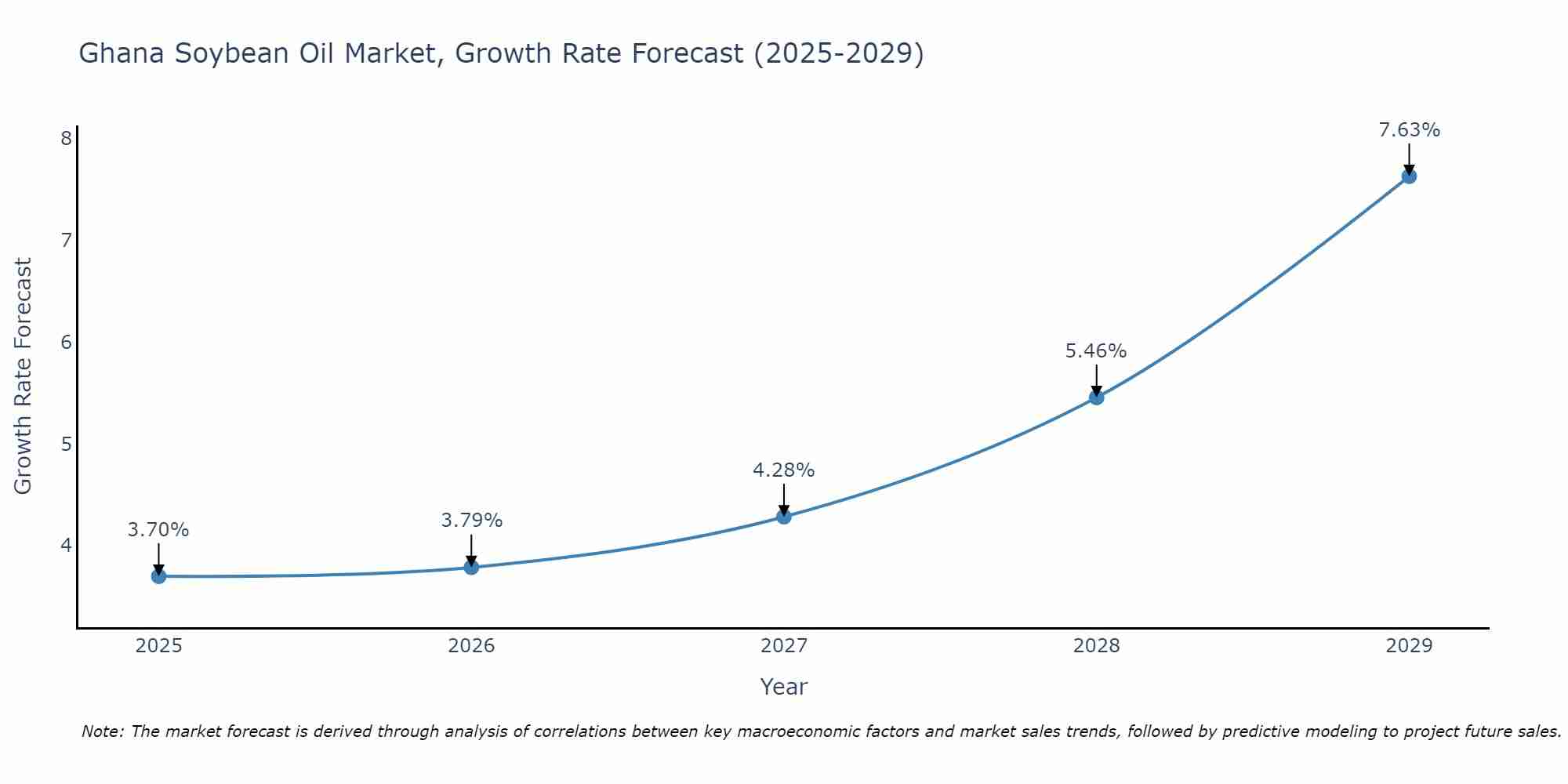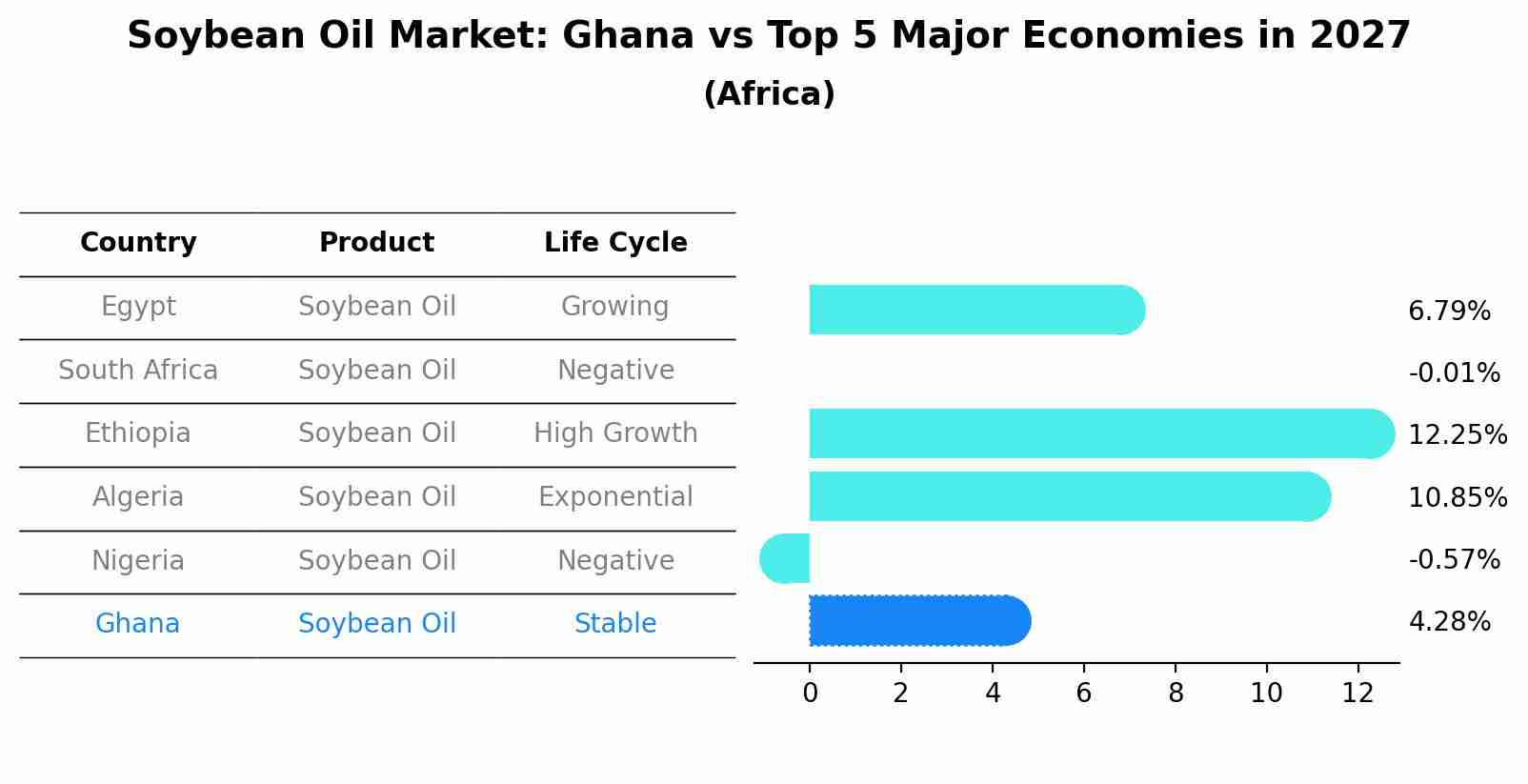Ghana Soybean Oil Market (2025-2031) Outlook | Forecast, Companies, Size, Growth, Trends, Value, Analysis, Revenue, Share & Industry
| Product Code: ETC385076 | Publication Date: Aug 2022 | Updated Date: Jul 2025 | Product Type: Market Research Report | |
| Publisher: 6Wresearch | Author: Bhawna Singh | No. of Pages: 75 | No. of Figures: 35 | No. of Tables: 20 |
Ghana Soybean Oil Market Size Growth Rate
The Ghana Soybean Oil Market is poised for steady growth rate improvements from 2025 to 2029. From 3.70% in 2025, the growth rate steadily ascends to 7.63% in 2029.

Soybean Oil Market: Ghana vs Top 5 Major Economies in 2027 (Africa)
The Soybean Oil market in Ghana is projected to grow at a stable growth rate of 4.28% by 2027, within the Africa region led by Egypt, along with other countries like South Africa, Ethiopia, Algeria and Nigeria, collectively shaping a dynamic and evolving market environment driven by innovation and increasing adoption of emerging technologies.

Ghana Soybean Oil Market Synopsis
The Ghana Soybean Oil Market is witnessing steady growth driven by increasing consumer awareness about the health benefits of soybean oil. With a growing population and rising disposable incomes, there is a growing demand for healthier cooking oils in Ghana. Local production of soybeans is also on the rise, leading to a more sustainable supply chain for soybean oil production. The market is competitive, with both local and international players vying for market share through product innovation and marketing strategies. Key factors influencing the market include changing consumer preferences towards healthier oils, government initiatives to promote local production, and the expanding food processing industry in Ghana. Overall, the Ghana Soybean Oil Market presents opportunities for growth and investment in the coming years.
Ghana Soybean Oil Market Trends
In the Ghana Soybean Oil Market, there is a growing trend towards increased consumption of soybean oil due to its perceived health benefits and versatility in cooking. Consumers are increasingly seeking healthier cooking oils, leading to a shift away from traditional oils towards soybean oil. The market is also witnessing a rise in demand for locally produced soybean oil, driven by the growing emphasis on supporting domestic agriculture and reducing dependence on imports. Furthermore, there is a noticeable trend towards the use of soybean oil in various food processing industries, including the bakery and confectionery sectors. Overall, the Ghana Soybean Oil Market is experiencing a shift towards healthier, locally produced options with diverse applications in the food industry.
Ghana Soybean Oil Market Challenges
In the Ghana Soybean Oil Market, some challenges include inconsistent supply due to weather conditions affecting crop yields, lack of modern farming techniques leading to low productivity levels, and inadequate storage facilities resulting in post-harvest losses. Additionally, competition from imported soybean oil products, price fluctuations in the global market, and limited access to financing for small-scale farmers are hurdles faced by players in the industry. Addressing these challenges will require investments in infrastructure, education on modern agricultural practices, improved storage and processing facilities, and policies that support local production and reduce dependency on imports. Overall, overcoming these obstacles can help boost the growth and sustainability of the Ghana Soybean Oil Market.
Ghana Soybean Oil Market Investment Opportunities
The Ghana soybean oil market presents promising investment opportunities due to the country`s increasing demand for edible oils and the government`s efforts to promote domestic production. With a growing population and rising consumer awareness of the health benefits of soybean oil, there is a significant market potential for investors to capitalize on. Investing in soybean oil production facilities, distribution networks, and marketing strategies can be lucrative in this market. Additionally, partnering with local farmers to cultivate soybeans can provide a sustainable and cost-effective supply chain for the production of soybean oil. Overall, the Ghana soybean oil market offers a favorable environment for investors looking to tap into the growing demand for edible oils in the country.
Jordan Agar Market Government Policies
Government policies related to the Ghana Soybean Oil Market include the imposition of import tariffs to protect domestic production, promotion of local processing to add value to soybeans, and the implementation of quality standards to ensure food safety. The government has also provided support to farmers through subsidies, extension services, and access to credit to increase soybean production. Additionally, initiatives such as the Planting for Food and Jobs program aim to boost agricultural productivity and enhance food security in the country. Overall, these policies are geared towards stimulating growth in the Ghana Soybean Oil Market, reducing reliance on imports, and supporting the development of the local agricultural sector.
Ghana Soybean Oil Market Future Outlook
The future outlook for the Ghana Soybean Oil Market appears promising as increasing consumer health consciousness drives demand for healthier cooking oils. With a growing population and rising disposable incomes, there is a trend towards healthier food choices, including the shift towards soybean oil due to its perceived health benefits. Additionally, the government`s initiatives to promote local production and reduce reliance on imports could further boost the market. However, challenges such as fluctuations in global soybean prices and competition from other cooking oils may impact market growth. Overall, the Ghana Soybean Oil Market is expected to experience steady growth in the coming years, driven by changing consumer preferences and government support for the local agricultural sector.
Key Highlights of the Report:
- Ghana Soybean Oil Market Outlook
- Market Size of Ghana Soybean Oil Market, 2024
- Forecast of Ghana Soybean Oil Market, 2031
- Historical Data and Forecast of Ghana Soybean Oil Revenues & Volume for the Period 2021 - 2031
- Ghana Soybean Oil Market Trend Evolution
- Ghana Soybean Oil Market Drivers and Challenges
- Ghana Soybean Oil Price Trends
- Ghana Soybean Oil Porter's Five Forces
- Ghana Soybean Oil Industry Life Cycle
- Historical Data and Forecast of Ghana Soybean Oil Market Revenues & Volume By End-Use for the Period 2021 - 2031
- Historical Data and Forecast of Ghana Soybean Oil Market Revenues & Volume By Food for the Period 2021 - 2031
- Historical Data and Forecast of Ghana Soybean Oil Market Revenues & Volume By Feed for the Period 2021 - 2031
- Historical Data and Forecast of Ghana Soybean Oil Market Revenues & Volume By Industrial for the Period 2021 - 2031
- Ghana Soybean Oil Import Export Trade Statistics
- Market Opportunity Assessment By End-Use
- Ghana Soybean Oil Top Companies Market Share
- Ghana Soybean Oil Competitive Benchmarking By Technical and Operational Parameters
- Ghana Soybean Oil Company Profiles
- Ghana Soybean Oil Key Strategic Recommendations
Frequently Asked Questions About the Market Study (FAQs):
- Single User License$ 1,995
- Department License$ 2,400
- Site License$ 3,120
- Global License$ 3,795
Search
Thought Leadership and Analyst Meet
Our Clients
Related Reports
- South Africa Stationery Market (2025-2031) | Share, Size, Industry, Value, Growth, Revenue, Analysis, Trends, Segmentation & Outlook
- Afghanistan Rocking Chairs And Adirondack Chairs Market (2026-2032) | Size & Revenue, Competitive Landscape, Share, Segmentation, Industry, Value, Outlook, Analysis, Trends, Growth, Forecast, Companies
- Afghanistan Apparel Market (2026-2032) | Growth, Outlook, Industry, Segmentation, Forecast, Size, Companies, Trends, Value, Share, Analysis & Revenue
- Canada Oil and Gas Market (2026-2032) | Share, Segmentation, Value, Industry, Trends, Forecast, Analysis, Size & Revenue, Growth, Competitive Landscape, Outlook, Companies
- Germany Breakfast Food Market (2026-2032) | Industry, Share, Growth, Size, Companies, Value, Analysis, Revenue, Trends, Forecast & Outlook
- Australia Briquette Market (2025-2031) | Growth, Size, Revenue, Forecast, Analysis, Trends, Value, Share, Industry & Companies
- Vietnam System Integrator Market (2025-2031) | Size, Companies, Analysis, Industry, Value, Forecast, Growth, Trends, Revenue & Share
- ASEAN and Thailand Brain Health Supplements Market (2025-2031) | Strategy, Consumer Insights, Analysis, Investment Trends, Opportunities, Growth, Size, Share, Industry, Revenue, Segments, Value, Segmentation, Supply, Forecast, Restraints, Outlook, Competition, Drivers, Trends, Demand, Pricing Analysis, Competitive, Strategic Insights, Companies, Challenges
- ASEAN Bearings Market (2025-2031) | Strategy, Consumer Insights, Analysis, Investment Trends, Opportunities, Growth, Size, Share, Industry, Revenue, Segments, Value, Segmentation, Supply, Forecast, Restraints, Outlook, Competition, Drivers, Trends, Demand, Pricing Analysis, Competitive, Strategic Insights, Companies, Challenges
- Europe Flooring Market (2025-2031) | Outlook, Share, Industry, Trends, Forecast, Companies, Revenue, Size, Analysis, Growth & Value
Industry Events and Analyst Meet
Whitepaper
- Middle East & Africa Commercial Security Market Click here to view more.
- Middle East & Africa Fire Safety Systems & Equipment Market Click here to view more.
- GCC Drone Market Click here to view more.
- Middle East Lighting Fixture Market Click here to view more.
- GCC Physical & Perimeter Security Market Click here to view more.
6WResearch In News
- Doha a strategic location for EV manufacturing hub: IPA Qatar
- Demand for luxury TVs surging in the GCC, says Samsung
- Empowering Growth: The Thriving Journey of Bangladesh’s Cable Industry
- Demand for luxury TVs surging in the GCC, says Samsung
- Video call with a traditional healer? Once unthinkable, it’s now common in South Africa
- Intelligent Buildings To Smooth GCC’s Path To Net Zero


















